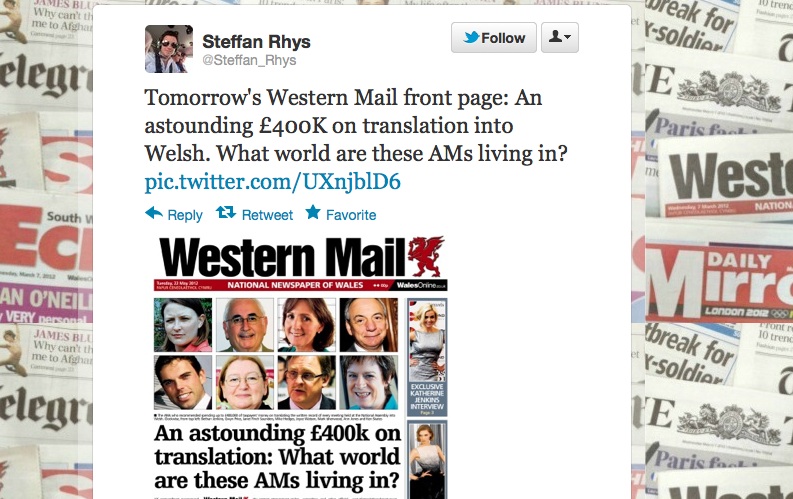The Western Mail caused much debate yesterday after publishing a front page editorial responding to a report claiming that proposals had been made for records of meetings at the Welsh National Assembly to be translated into Welsh at an estimated cost of up to £400,000.
In the editorial the Western Mail said this sort of service may therefore be “a luxury we cannot afford”.
The report prompted a Twitter hashtag debating the decision to run the editorial called #westernfail and much press commentary, from the Independent’s Rob Williams here, to the BBC’s political editor for Wales, Betsan Powys, who said the article worked to “raise some questions about the value for money of a set of recommendations from politicians – albeit in pretty uncompromising terms”.
Here’s the response issued by the Western Mail:
We fully support the right of AMs and others to address meetings in Welsh or English, according to their choice, and the publication in both languages of the official Record of Proceedings of plenary meetings.
But we believe the recommendation to translate all Assembly proceedings into Welsh, at such enormous cost, is a step too far in this period of austerity.
At a time when front-line public service and benefits to poorer people are being cut, we cannot in all conscience support a huge increase in the National Assembly’s translation budget. That is why we back the Assembly Commission’s draft Bill and oppose the amendment proposed by the communities, equality and local government committee.
At the time of writing the online version of the article had received 448 comments. BBC Radio Wales yesterday asked if the editorial is “an attack on the Welsh language?”.
Chief reporter Martin Shipman, who secured the original story, said “this is not about the Welsh language” and that the newspaper will not be apologising and stands by the piece.
In all conscience when priorities are being looked at we could not support the spending of a considerable amount of extra money on Welsh language translation services at a time when the poorest people in Wales are being hit by benefit cuts and public service cuts.
